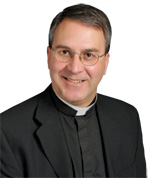 Q: On the heels of Democrats in the Senate releasing a 500-page report on the use of torture by the CIA, is there a way to justify physical harm to one person in order to help save others?
Q: On the heels of Democrats in the Senate releasing a 500-page report on the use of torture by the CIA, is there a way to justify physical harm to one person in order to help save others?
A: The Catechism of the Catholic Church teaches: “Torture which uses physical or moral violence to extract confessions, punish the guilty, frighten opponents, or satisfy hatred is contrary to respect for the person and for human dignity” (CCC #2297).
Catholic Social Teaching holds that every person’s intrinsic and immeasurable dignity must always be respected. Torture destroys human dignity. A government should never promote, sponsor or tolerate any form of torture, doing so dehumanizes the victim and “sets a dangerous precedent that undermines the respect for everyone’s human dignity and human rights,” according to the U.S. Conference of Catholic Bishops in the 2012 Catholic study guide, “Torture is an Intrinsic Evil.”
This becomes a difficult and challenging issue because of what happened in our country on Sept. 11, 2001. Our country was brutally attacked, and thousands of people lost their lives. We must always honor those people as well as all the police and rescue workers who worked so hard to save lives that day.
We also believe it is necessary to protect our country from future terrorist attacks. But we can never justify evil with more evil.
“Torture makes the fight against terrorism more difficult because it encourages more militants to take up arms against the United States. It fuels anti-American sentiment,” according to the bishops’ study guide.
The United States government certainly has an obligation to defend its citizens, and the government certainly has the right as a country to interrogate individuals, but torture of any kind is wrong.
The United Nations has called for an end to all torture around the world. In 1988 and 1994 the United States signed and ratified the United Nations Convention against Torture, an international human rights treaty that condemns torture throughout the world.
We are called to respect all human life.
“Torture contaminates society and debases it. … What we do to one another we ultimately do to ourselves, because as social beings our fates are bound together. A society that tolerates torture threatens the common good of all persons because it undermines respect for human dignity and basic human rights,” wrote Stephen Colecchi in an article for America, “No Excuses for Torture,” Jan. 18, 2010.
Q:I’ve been confused by some of the discussion surrounding the 2014 Synod of Bishops on the family. Pope Francis said the Catholic Church needs to consider ways to integrate the divorced and civilly remarried into the life of the church, not just allow them to receive Communion, but also serve as extraordinary ministers of holy Communion and as godparents. Can you help clarify the church’s teaching in this area?
A: Jesus taught “a man shall leave his father and mother and be joined to his wife, and the two shall become one flesh, so they are no longer two, but one flesh. Therefore, what God has joined together, no human being must separate” (Mt 19:5-6).
It has long been Catholic teaching that a sacramental marriage is for life, but we also know that this is not the reality for all people. Divorce is a part of society and many Catholics are divorced and civilly remarried. So, Pope Francis, as well as many bishops from around the world, have stated that while holding up the sanctity of marriage, this issue must be addressed.
The German conference of bishops has been the most outspoken on this matter. Cardinal Reinhard Marx recently stated, “Civil divorce and remarriage often cause people to distance themselves from the church, or widen the distance they already felt before the divorce. It is not uncommon for this evolution to lead to the abandonment of the Christian faith, and this is why the German bishops’ conference wants to step up its pastoral outreach.”
So what are they trying to achieve? Pope Francis has been trying to send a message of inclusivity, welcoming the repentant sinners and working with them. On this particular issue there is the hope to find a balance between the church’s teaching and pastoral work upholding Jesus’ instruction on the indissolubility of marriage, as well as the church’s teaching and pastoral work upholding Jesus’ teaching of God’s mercy on those who are sinners.
Pope Francis and the German bishops are not promoting that all divorced and civilly remarried Catholics should automatically be permitted to receive the sacraments. The German conference of bishops is pleading for “differentiated solutions, which will respond equitably to each case and permit readmission under certain conditions,” according to a Dec. 30, 2014, Catholic News Service story by Jonathan Luxmoore.
The 2014 Synod of Bishops on the family was only the preliminary conversation for the General Synod in 2015. So the conversation will continue and the Holy Spirit will guide.
(Fr. Herda, ordained in 1990, is pastor of St. Monica Parish, Whitefish Bay, and St. Eugene Parish, Fox Point. If you have a question you’ve always wanted to ask a priest, email it to ruscht@archmil.org and place “Ask Fr. Jerry” in the subject line.)
